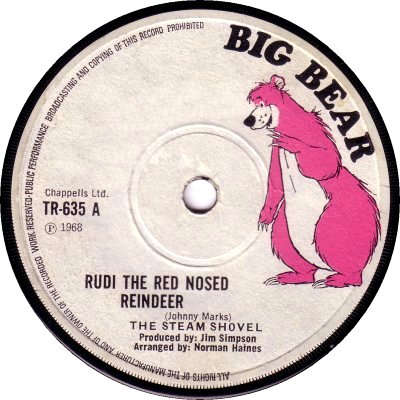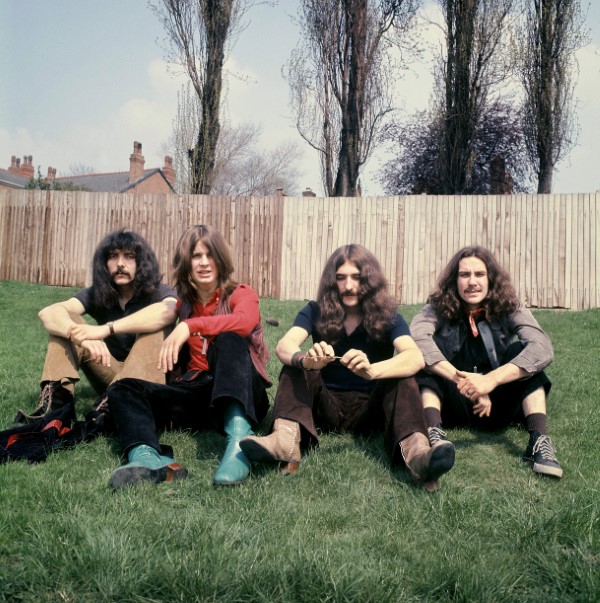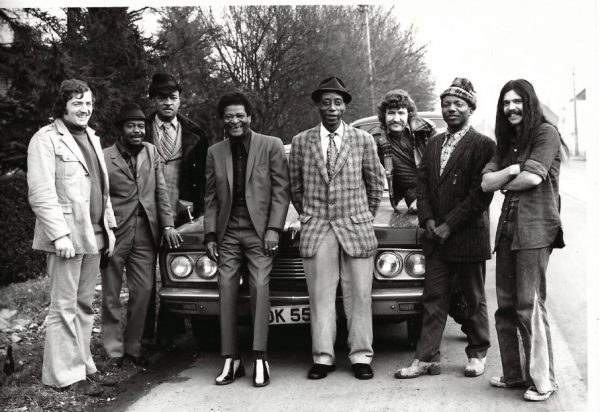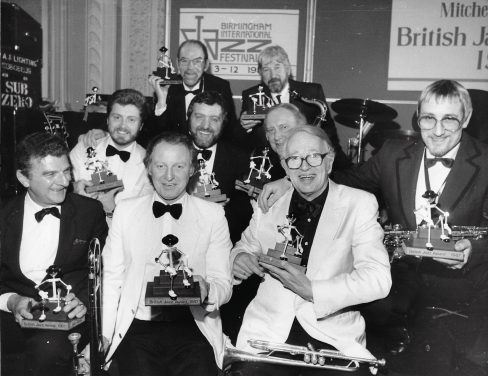

Big Bear Records was founded in October 1968 by Jim Simpson, the man who took Black Sabbath from obscurity as the Aston-based blues band Earth onto the charts with the albums “Black Sabbath” which charted at number 8 and “Paranoid” which reached number one in 1970 and went on to sell over 5 million copies worldwide. Black Sabbath had to wait until 2013 before they enjoyed another number one album.
Meanwhile Big Bear signed Bakerloo and Tea & Symphony to EMI Harvest and The Dog That Bit People to Parlophone, and later Hannibal to B&C Records, Indian Summer to RCA Neon and Brewers Droop to RCA.
Big Bear then set up what was considered to be the first “progressive music” club outside London in a rented Birmingham pub room. He named it Henry’s Blueshouse and declared that Tuesdays Is Bluesdays. Intended as a showcase for Bakerloo and their hotshot teen guitarist Dave ‘Clem’ Clempson [later Humble Pie and Colosseum], Henry’s soon took on a life of its own, presenting American bluesmen such as Arthur Big Boy Crudup, JB Hutto and Champion Jack Dupree as well as emerging British rockers Status Quo, Rory Gallagher and Taste and Thin Lizzy [full list here].

Earth, initially booked at Henry’s as support to Ten Years After, were taken up by Simpson for management, where they were name-changed to Black Sabbath. He eventually signed them to Vertigo just as he, having fourteen rejections from majors, was about to release them on Big Bear as a last resort.
The week Big Bear lost Sabbath, the single Paranoid was at number 2, the albums Black Sabbath and Paranoid were at number 16 and 1 respectively, leaving Simpson at a crossroads. Should he continue developing unknown bands only to lose them to a smooth-talking London management company just as they achieved success, or does he take on a new challenge?
By then, The Blues had beckoned.

Checking the temperature of the water by organising a seven week UK/European tour with The King Biscuit Boy from Toronto, promoting his RCA album, Big Bear then committed itself to locating significant but often lesser-known American bluesmen, bringing them in from the USA to tour and record. The first Big Bear blues recordings were leased to Polydor: American Blues Legends 73 with Lightnin’ Slim, Whispering Smith, Homesick James, Snooky Pryor, Boogie Woogie Red and Homesick James, followed by albums with Dr Ross The Harmonica Boss, Gene ‘The Mighty Flea’ Connors and the UK-based American Harmonica player Oakland Johnny Mars. Big Bear then leased their Eddie Guitar Burns “Bottle Up And Go” album and Homesick James & Snooky Pryor album to Action and Richard Branson’s Caroline Records respectively. The next big move was to sign Big Bear Records to Transatlantic Records for manufacture and distribution in the UK and to a network of non-UK labels garnered through his attendances at Midem, the Cannes convention and trade fair, which Big Bear was to attend regularly for a total of 32 years. Initially a blues label featuring such artists as Cousin Joe from New Orleans, Eddie Playboy Taylor, Dr Ross, Tommy Tucker, Willie Mabon, Mickey Baker [full list here], the repertoire was later widened to include jazz releases spear headed by Clark Terry’s Big Bad Band at Carnegie Hall.
Enjoying all the advantages of being absolutely independent with only the bank manager to answer to, Big Bear has always enjoyed going off at a tangent. The only house rule is that the music has to be good. ‘Real Music, Properly Played’ has long been the maxim. So alongside the blues albums there were excursions into soul and funk with Roy Gee, who was later to join The Drifters and the blue-eyed soul band Muscles who took on UK and European support slots on tours by The Fatback Band, Blood, Sweat & Tears, The Commodores, Tower of Power and more. Big Bear’s contribution to the punk movement included Garbo’s Celluloid Heroes and The Quads whose 1979 hit “There Must Be Thousands” was declared by John Peel to be his favourite single of the decade, and is included in the famous John Peel box-set.
Meanwhile, flying under the flag of Big Bear Music, the company continued to tour the artists it recorded, as well as organising events. The most significant of these was launched in 1985: The Birmingham Jazz & Blues Festival. Over the years, the festival has presented more than 6500 performances to a total of 2.8 million people. Headliners have included Miles Davis, Dizzy Gillespie, Count Basie Orchestra, Buddy Rich Orchestra, Art Blakey’s Jazz Messengers, The Blues Brothers Band from that film, BB King, Albert King, Freddy King and The Buddy Guy/Junior Wells Band [selected list here]

Events organised by Big Bear include The Marbella Jazz Festival for five years, The Arctic Border Blues Festival in Norway and The Soviet Union, Birmingham Super Prix Trackside Entertainment, The National Jazz Festival [in 21 cities from Durham to Basildon, Bristol to Barking], New York Non Stop with British Airways and Soho Jazz Festival [full list here]
Every year since 1987 Big Bear has organised The British Jazz Awards, known as The Jazz Oscars, which recognise the finest British jazz performers. The winners are selected by popular vote with as many as 5000 voters across the 17 categories. This is the most important formal event in The British Jazz calendar and achieved international significance when Miles Davis won the Getzen Fairweather Award and Nina Simone flew into Birmingham to receive her Platinum Record for “My Baby Just Cares For Me”.
In 1987 Big Bear first published The Jazz Rag, the nationally distributed bi-monthly magazine, which to date has published over 160 editions. Contributors include leading British jazz writers, Scott Yanow, who is one of the most respected of all American jazz journalists, and top British Jazz musicians.
The artist agency aspect of Big Bear Music has always been prominent in much of the company’s activity. Initially set up to market the bands on the record label, which it still does, it represents a roster of interesting bands.
Lady Sings The Blues is a 2 hour show that delivers the Billie Holiday repertoire, chronologically through the 30s, 40s and 50s. It is performed by an all-star seven piece band based on Billie’s early recording bands and fronted by a remarkable jazz singer, Val Wiseman. Val is probably one of the best two female British jazz singers ever and the band consists of some of the finest British jazz musicians extant. Lady Sings The Blues is almost certainly the nearest that any of us will ever come to experiencing first hand a performance by that greatest of all jazz singers. Interestingly, Lady Sings The Blues has been on the road performing Billie’s repertoire for 31 years, just 5 years more than Lady Day herself.

King Pleasure & The Biscuit Boys were formed in a Darlaston milk bar where a group of lads, inspired by Bill Haley & The Comets and none of them musicians at that time, decided to form a Rock and Roll Band. They each selected an instrument, hit on their parents for the wherewithal to buy it and set about learning to play. They came to the attention of Jim Simpson as contestants in a Band Contest which he was judging. Originally known as The Satellites, Jim renamed them King Pleasure & The Biscuit Boys on New Year’s Eve 1987. Thirty one years, 6500 gigs, 36 radio shows, 76 television appearances and 10 Big Bear albums later, they are well established a one of the finest swing bands on this planet, and remain loyally Birmingham-based.
Tipitina are from Leyland, Lancashire, but their spiritual home is New Orleans, Louisiana. They feature the stunning, gospel-soaked voice of Debbie Jones and the no-prisoners taken pianistics of Justin Randall to deliver a potent New Orleans Gumbo of James Booker, Professor Longhair, Dr John et al. Already with two Big Bear albums, their third in the planning stage.
The Whiskey Brothers come at you direct from the 1930s Mississippi Juke Joints, or more precisely, Kings Heath in Birmingham. The Whiskeys are authentic, impeccably so, the real deal and are now working on their second Big Bear album.
Despite making only two public appearances, Kenny Bakers Dozen were probably the best-known and best-loved of all British Big Bands. The mercurial trumpet man starred with all the leading British bands, as well as with The Benny Goodman Orchestra, during the 1930s to 1950s but most importantly his Dozen were broadcast live, every week, from The BBC Paris Studio. Other than that, they appeared in the film, To Beat The Band, and also opposite Billie Holiday at The Royal Festival Hall. After years of working with Kenny, Simpson persuaded Kenny to put the Dozen on the road, with Kenny handling the arrangements and Simpson organising the musicians. The band’s first performance was a six night season at Ronnie Scotts in Birmingham where they recorded a live album for Big Bear Records before going on the road through the UK and Europe.
Not content with discovering, nurturing, recording and promoting unknown bands, Big Bear have produced memorable shows to bring something unusual to the table. There was, still is when called upon, Drummin’ Man, a showcase for the drumnastics of the legendary Gene Krupa from his days with Benny Goodman, his own Big Band and his small combos. The band features the tremendous Birmingham drummer Pete York – he of Spencer Davis Group fame, think “Keep On Runnin’”, “I’m A Man” and more – and an all-star handpicked seven piece band.
“Beiderbecke and All That Jazz” enjoyed a simple but effective formula. Playwright Alan Plater [The Beiderbecke Tapes, The Beiderbecke Affair etc] told his own stories which the all-star band onstage clearly found fascinating. Then the band played which left Alan overcome with joy. An evening never passed so quickly or so enjoyably.
Big Bear has long been a caring bedfellow with photography. The catalogue of some 2500 black and white square negatives have so far yielded six exhibitions in the UK and Spain, and that’s from the only 150 negatives to be so far digitised.
Leading Dutch photographer Merlin Daleman, twice winner of the Silver Camera Award for Best Documentary Photographer in Holland is resident photographer at Big Bear events and has seen his work featured in several major exhibitions including extended displays on the Main Concourse of Birmingham New Street Station.